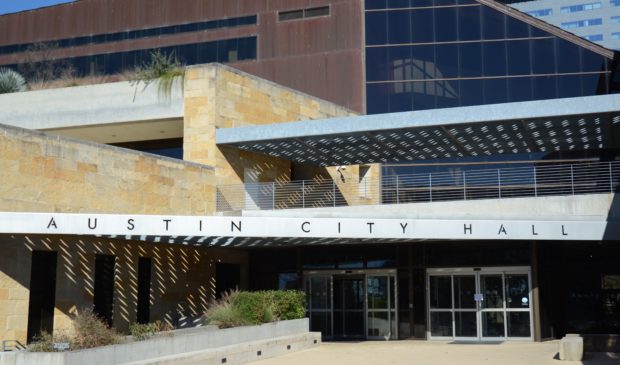Newsletter Signup
The Austin Monitor thanks its sponsors. Become one.
Most Popular Stories
- Parks Board recommends vendor for Zilker Café, while voicing concerns about lack of local presence
- Office slowdown sparks new downtown housing ambitions
- City leaders evaluate surprising ideas for water conservation
- Audit: Economic official granted arts, music funding against city code
- Downtown Historic Resource Survey eyes seven new districts eligible for designation
-
Discover News By District
Popular Whispers
Sorry. No data so far.

With stunning speed, Council approves budget
Wednesday, September 12, 2018 by Jack Craver
For the first time in years, City Council spent less than a day deliberating on its fiscal year budget.
Council approved a $4.1 billion budget that will raise the effective property tax rate by 5.4 percent. Austin property owners will pay 44.03 cents per $100 of property valuation. That rate is actually lower than the previous year, meaning that the city will be increasing its revenue due to rising property values and new construction, not due to a higher tax rate.
The tax levy approved in the final budget was 0.5 percent higher than the 4.9 percent levy included in the budget proposed by City Manager Spencer Cronk earlier this summer.
Overshadowing the budget deliberations was the prospect of Gov. Greg Abbott and his allies in the Legislature finally making good on their longstanding promise to impose strict limits on local governments’ tax-raising authority. Abbott has proposed reducing the rollback rate – the maximum tax levy increase allowed without getting approval from voters – from 8 to 2.5 percent.
Deputy Chief Financial Officer Ed Van Eenoo suggested that the best way for Council to brace for a major blow to its taxing powers would be to raise taxes as much as possible this year and then put as much of that money as possible into a rainy day fund.
Mayor Steve Adler advocated taking that route. Five of his colleagues – Mayor Pro Tem Kathie Tovo and Council members Greg Casar, Ann Kitchen, Leslie Pool and Pio Renteria – joined him early in the day in supporting increasing the tax levy to 5.9 percent, while Council members Jimmy Flannigan, Ellen Troxclair, Delia Garza and Ora Houston voted to keep it at 4.9 percent (Council Member Alison Alter abstained). That increased revenue amounted to roughly $5 million.
Later in the day, however, Council voted to allocate roughly half of that increased revenue to a variety of programs, such as victim service counselors, homelessness services and parent support specialists in the Austin Independent School District.
And at the end of the day, Council voted 6-5 to knock the tax rate down to 5.4 percent and not raise the additional $2.5 million to put into reserve. Troxclair, Flannigan, Garza, Renteria, Houston and Alter supported that motion, while the others opposed.
Council Member Delia Garza said she was reluctant to vote against a number of proposals during the day to increase funding for certain programs. She noted that she had opposed the increase to the homestead exemption that Council approved earlier in the year. That increased exemption deprived the city of about $5 million.
Unfortunately, said Garza, she did not feel comfortable asking voters to both approve a $925 million bond package and absorb a significant property tax hike.
Adler said that he was “proud” of the budget, highlighting the increased funding that the city committed to affordable housing initiatives, homelessness, parks and other priorities.
Adler also stressed that the city’s impact on property taxes is relatively small and argued that the great majority of the tax burden people feel is due to the state’s school funding formula, which recaptures much of Austin’s property tax revenue and reallocates it to other districts.
“I would urge the state leaders, the legislators, to focus on providing relief to the people who live here,” said Adler. “Really it’s the only one that can provide relief at the magnitude that people can feel.”
Troxclair, the only Council member who voted against the budget, emphasized that what Abbott has proposed would not prevent cities from raising taxes, but would require them to get voter approval.
“I will continue to support efforts at the state Legislature to make sure that taxes at all levels of government … are done efficiently and responsibly,” she said.
In recent years, Council’s budget deliberations have stretched over three full days. This year, Council took its final vote to approve the budget at 6 p.m. on the first day. Council members and city staff reacted with disbelief and applause when the final vote was cast.
Photo by John Flynn.
The Austin Monitor’s work is made possible by donations from the community. Though our reporting covers donors from time to time, we are careful to keep business and editorial efforts separate while maintaining transparency. A complete list of donors is available here, and our code of ethics is explained here.
You're a community leader
And we’re honored you look to us for serious, in-depth news. You know a strong community needs local and dedicated watchdog reporting. We’re here for you and that won’t change. Now will you take the powerful next step and support our nonprofit news organization?


